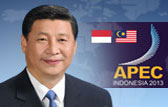
China-German relations
Updated: 2013-11-14 15:08
By Cui Hongjian (China Daily)
Comments Print Mail Large Medium SmallChina and Germany remain close trade and economic partners to share the benefits of cooperation despite their differences
German officials once described Sino-German relations as a "special partnership", which is evident in the frequent mutual visits of the two heads of government and the high-level, wide-ranging, multi-issue Sino-German consultations.
Currently, Sino-German consultations are the only inter-government dialogue at the highest level in China's foreign relations. The one-on-one talks between more than 20 ministers from the two countries covered all areas of domestic and foreign policies, with all the discussed subjects having the potential of being implemented.
The closeness between China and Germany is rarely seen in other bilateral relations between world powers. What makes the "relationship" of China and Germany special is their interdependence.
The drastic changes in the world situation have redefined the international roles of China and Germany. The United States' economic recovery has been stuttering, Europe is still grappling with its debt crisis and Japan is tied in knots over its internal contradictions. In contrast, China has not only maintained its economic vitality, but also fueled the Asia-Pacific region with its growth momentum. As a result, the Asia-Pacific is the only hope against the global economic downturn.
Besides, China has been shouldering greater international responsibilities and playing an increasingly important and indispensable role in global economic governance and the reform of the international financial system.
But economic interdependence makes it impossible for China to "thrive" by itself. Since the beginning of this year, the global downturn has harmed China's foreign trade and investment. So China needs reliable global partners to reduce external uncertainties and maintain sustainable development.
German, however, needs a reliable partner more urgently, for it has to keep playing an important role in dealing with the European debt crisis, which has lasted three years but is still far from over.
Germany smoothly consolidated its dominant position in the European economy after its reunification because of a single European market. This means Germany has benefited from the European integration as well as the euro.
Germany has become the beacon of hope for the otherwise debt-crisis-ridden Europe. Because of the special political and economic structure of Europe, Germany provides the largest funds for the emergency response mechanism to overcome the debt crisis.
As a major player offering resolutions to crises and leading the way toward further European integration, Germany has to work under dual pressure of honoring domestic public opinion and maintaining favorable foreign policies.
Since the outbreak of the debt crisis, China has provided massive support to Europe in the fields of politics, trade, finance and investment through bilateral and multilateral channels. And Merkel is convinced that China's financial support and its stable position as Germany's largest market are important "external forces" she must use to deal with her country's "internal problems". That's why her latest visit to Beijing can be seen as being aimed at consolidating this partnership of mutual need.
The significance of Sino-German cooperation goes beyond bilateral ties. The closeness of China and Germany, despite the differences in their ideologies, political systems and cultures, is the result of a long-term strategy.??
Sino-German cooperation focuses on maintaining and promoting economic and trade cooperation. Their cooperation in trade and economy as well as in science and technology is the driving force of their relations.
Despite their closeness, China and Germany are bound to have trade frictions because they are major trading countries. But they can resolve their differences by reaching agreements through talks.
The debate over the Sino-German "special partnership", however, continues. Some people complain that the European Union and other European countries are being marginalized under the shadow of close Sino-German cooperation.
Others argue that the flourishing Sino-German friendship may imperil Europe's overall relations with China over a range of issues important to the EU, including human rights, climate change and foreign policy. They accuse Merkel of focusing only on economic issues and sparing China the "trouble" of talking about human rights and other political issues.
The first concern is unnecessary. China has been consistent in its policy of supporting European integration and developing cooperative relations with the EU and European countries in a balanced way. Sino-German cooperation has been "special" because they are the largest economies in their regions and major global manufacturing and trading powers. Also, their achievements and deals have been in line with the interests of Europe and the world as a whole.
The second accusation is not only contrary to the global trend and smacks of arrogant "Eurocentrism", but also disregards the overall situation and priorities.
The achievements of this round of Sino-German consultations and the use of their cooperation for the good of the international community will be the most resounding answer to the skeptics.
The author is director of European Studies at the China Institute of International Studies.






